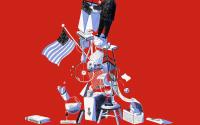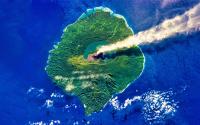Common Dreams / Published on Saturday, November 25, 2006 by The Australian (Australia's national daily newspaper) Patrick Walters
The former SAS officer who devised and executed the Iraq war plan for Australia's special forces says that the nation's involvement has been a strategic and moral blunder.
Peter Tinley, who was decorated for his military service in Afghanistan and Iraq, has broken ranks to condemn the Howard Government over its handling of the war and has called for an immediate withdrawal of Australian troops.
 'DUPED'Tinley at Monument Hill in Fremantle, Australia yesterday. (Photo/Ian Munro) 'DUPED'Tinley at Monument Hill in Fremantle, Australia yesterday. (Photo/Ian Munro) |
"This war duped the Australian Defence Force and the Australian people in terms of thinking it was in some way legitimate."
As the lead tactical planner for Australia's special forces in the US in late 2002, Mr Tinley was in a unique position to observe intelligence on Iraq's weapons of mass destruction program and the coalition's military preparations in the lead-up to the war.
Mr Tinley, 44, who retired from the army last year after a distinguished 25-year career, said the US-led coalition had been naive in its thinking about what it could achieve after a quick military invasion of Iraq.
"They never had enough troops to fully lock down the major centres and infrastructure or the borders," he said.
In Iraq in 2003, Mr Tinley served as deputy commander for the 550-strong joint special forces task group that took control of western Iraq.
Part of his command was 1 SAS Squadron, which was awarded a US Meritorious Unit citation for its "sustained gallantry", contributing to a comprehensive success for coalition forces in Iraq.
He served 17 years with the elite SAS regiment, leaving the army as a major last year. In 2003 he was appointed a member of the Order of Australia (AM) for "dynamic leadership and consistent professional excellence".
His comments came as Baghdad experienced its deadliest day of sectarian violence since the coalition's March 2003 invasion, with 202 killed and 256 injured by five powerful car bombs in the Shia district of Sadr City.
In recent weeks, British Prime Minister Tony Blair has conceded Iraq has become a "disaster", while the Iraq quagmire contributed to the swing against US President George W.Bush in this month's congressional elections.
Britain has set a tentative timetable this week for withdrawing some of its troops, while the US and coalition forces consider options to end the conflict, which could include a short-term lift in troop numbers.
John Howard said yesterday that despite all Iraq's problems, he still believed he had made the right decision to take Australia to war in 2003.
"Everybody back in 2003, including Kim Beazley and particularly Kevin Rudd and even (French President) Jacques Chirac, were all saying Iraq had weapons of mass destruction," the Prime Minister said.
He said Australia had not agreed to take on any new responsibilities in Iraq and any changes to Australia's 750-strong military presence would depend on a possible withdrawal of British forces.
During war planning with US and British special forces at Fort Campbell, Kentucky, in 2002, Mr Tinley says he never saw any hard intelligence that Saddam Hussein's regime possessed weapons of mass destruction.
"When I pressed them (US intelligence) for more specific imagery or information regarding locations or likely locations of WMD they confessed, off the record, that there had not been any tangible sighting of any WMD or WMD enabling equipment for some years," he said.
"It was all shadows and inferenced conversations between Iraqis. There was an overwhelming desire for all of the planning staff to simply believe that the Iraqis had learned how to conceal their WMD assets away from the US (surveillance) assets."
Coalition special forces troops were charged with hunting down Scud missiles and Saddam's suspected WMD arsenals, operating from just west of Baghdad all the way through to the Jordanian border, and between the Syrian and Saudi frontiers.
After the initial invasion, the search for WMD became something of a "standing joke" with neither coalition troops nor the Iraq Survey Group turning up anything of consequence.
"The notion that pre-emption is a legitimate strategy in the face of such unconvincing intelligence is a betrayal of the Australian way," he said.
Mr Tinley told The Weekend Australian he was now speaking out having expected people "far more capable and more senior than me" to have expressed serious reservations about Australia's involvement in Iraq.
"During our preparations for this war I remember hearing (ex-defence chief) General Peter Gration's misgivings and assumed he did not possess all the information that our Prime Minister did," he said. "I now reflect on his commentary with a completely different view and am saddened that other prominent people in our society didn't speak louder at the time and aren't continuing to speak out in light of what we now know."
He said the Government had broken a moral contract with its defence force in sending it to an "immoral war".
The Government's stance on Iraq and later on issues such as the Tampa had gradually allowed fear to become a motivating factor in the electorate, he said.
Mr Tinley said the Howard Government had failed to be honest with Australians about Iraq and "you can't separate the sentiment of the defence force from that of the people".
He advocates an immediate pullout of Australia's 500-strong task force in southern Iraq but accepts that security forces must be kept to guard the embassy in Baghdad. "Our 500 troops are in the south-west of Iraq under British tactical command while our US partners are doing all the heavy lifting in the remainder of the country," he said.
A more meaningful contribution could be through providing defence and security force training in a safer neighbouring country, such as Kuwait. "This is no slur on our soldiers. (Brigadier) Mick Moon and his men have been doing a fantastic job."






